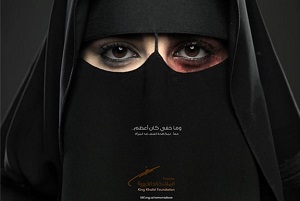By Julia Airey
Staff Writer
Last Monday the campaigning done by the King Khalid Foundation to combat domestic violence in Saudi Arabia led to a landmark victory. Thanks in part to the Foundation’s efforts, cabinet members of King Abdullah’s government signed into law a historic piece of legislation on the 26th of August.
The “Protection from Abuse” bill has a double aim: to combat and prevent violence against women, children, domestic workers, and non-domestic workers of the kingdom. The law itself was drafted after four months of aggressive campaigning from the charity funded by the reigning King Abdullah, “King Khalid Foundation”.
The bill would have those convicted of physical or physiological abuse serve up to one year in prison and pay up to 50,000 riyals, about 10,100 euros, in fines. Additionally, the law will provide victims of abuse with medical aid, shelter, as well as social and psychological help.
Two more elements of this bill make it groundbreaking: firstly, the law abolishes the requirement for women filing police complaints to be in the company of a male relative, and secondly, anonymity and immunity will be guaranteed to the women filing the complaint even if the court is unable to prove abuse.
The special attention given to abuse victims is a sharp change from how the legal system formerly treated domestic violence cases. Previously, all domestic abuse cases involving children, women, and domestic servants were under the jurisdiction of Sharia law’s penal code. Due to the ambiguity of this code, it was often up to judges to interpret the law. Such individualized interpretation led to a case-by-case basis for determining whether violence against women, children, or workers was justified. This happened frequently, due to the legality of using violence to discipline disobedient workers or family members.
This groundbreaking human rights legislation is being heralded worldwide for its progressiveness. However drafting legislation is never a perfect science. One upcoming issue to grapple with will be balancing the country’s conservative religion with such a progressive piece of legislation.
Saudi Arabia is a proponent of Wahhabism, a strict denomination of Islam, which imposes many restrictions on women based on laws and traditions that empower male guardians. The “Protection From Abuse” law is so historic because it undermines the sacred authority of male guardians by calling for restrictions on how they may exercise violence.
It is difficult to predict how the Saudi Arabian government will try to compensate for this loss of power, which is one of the reasons that critics of the bill have questioned how the government plans to implement the new law.
Ultimately, the nation’s supreme patriarchy poses many barriers for women to access the new benefits granted them by the law. For instance, there is the paradox of granting Saudi women anonymity and independence in reporting abuse cases, but still requiring them to be accompanied to the police station. It is important to note that it is still illegal for Saudi women to be in public without their male guardian and it is illegal for women to drive. At present it is difficult to understand how the Saudi Arabian government will tackle this and other practical obstacles without further undermining male authority.
Regardless of whether or not the implementation of this law proves difficult in the coming year, just the fact that the government passed this law is a landmark event for the kingdom. Coupled with King Abdullah’s other recent reforms, the “Protection from Abuse” law may indicate more changes to come for Saudi Arabia.

Julia Airey, class of 2015, is a Law and Linguistics major from Ashby, Massachusetts, United States.

Well put Julia. Hard to imagine a world
such as those women live in.
*Quran
I think it’s necessary to explain that Shariah law, like perhaps any body of law, is generally up for a lot of interpretation. Also, as Saudi Arabia proves by adopting the “Protection from Abuse” bill, Shariah law can be changed and adapted to the Zeitgeist – it’s a man-made construction, not static like Qu’ran. This is evident in the diverse range of implementations of Shairah Law across many nation states (Yemen, Uganda, Turkey, Oman, and parts of Indonesia and Nigeria)
The oppression you are referring to is in the interpretations of Shairah law, and of Islam, that comes from the state’s religion of Wahhabism (a very conservative denomination of Islam which only arose in the 18th century). However, again, the ratification of this bill would suggest that even Wahhabism is not incapable of flexibility.
The oppression of Saudi women will never stop unless Saudi-Arabia abandons the horrible and oppressive sharia and adopts a constitution that guarantees equal protection under the law to all Saudi citizens.